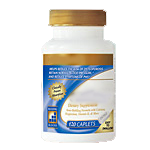Magnesium
Relax with the mineral that can calm your nerves
Magnesium is an essential mineral that is needed for good health. It is the fourth most abundant mineral in the body. Around 60% of the mineral can be found in your bones while the rest is found in the cells of organs and tissues. Very little is found outside the cells with only about 1% of the magnesium in your blood.
While there isn't much in the blood, the level is important and your body works hard to maintain a constant level. Once again, if these levels get low and you are not supplying what is necessary through your diet, the body will steal from the other cells in your organs and bones and create problems. These may not be immediate problems but they are problems that show up later in life.
Why is Magnesium Important?
Magnesium is required for many biological reactions within our body. Over 300 of them depend on this mineral including all the enzymes that are associated with generating ATP (the energy source for you cells). It is also important during the synthesis of DNA and RNA - the body's genetic blueprint.

Magnesium is also important for many other things throughout your body. It helps maintain a healthy immune system, supports muscle and nerve function, and helps keep the heart on a steady rhythm. It also helps with blood pressure, blood sugar levels and protein synthesis.
Research has shown that magnesium can help prevent or manage certain disorders such as diabetes, cardiovascular disease and hypertension.
And of course it might be known best as part of the calcium / magnesium combo that helps to keep bones strong. Magnesium can be thought of as the mortar that supports the calcium bricks. Bricks can only be strong and stable when combined with mortar. In the case of calcium, the mortar consists of vitamin D, magnesium, boron, vitamin K, zinc, copper, and manganese. With these nutrients, calcium has the support it needs to build bone density when you're young and minimize bone loss as you age.
Calcium and magnesium work closely together. Where calcium helps muscles to contract, magnesium helps them to relax. It also works in opposition with calcium when it comes to nerves and nerve excitability.
Sources of Magnesium

Magnesium can be found in a variety of food sources. Some of these include green leafy vegetables, fruits and nuts. You can also find it in whole grains. Products made from white bleached flour have had the magnesium stripped out of them. Whole grain breads and other products contain much more magnesium than their processed counterparts.
Magnesium Deficiency
Many people throughout the world and within the United States are deficient in magnesium. One study shows that only 32% of the U.S. meeting the RDA. It is not a shock that this deficiency occurs since magnesium is found in things like spinach, raw nuts, legumes and whole grains. Foods that most people tend to avoid - especially kids.
Low levels of magnesium have been associated with quite a few disorders and illnesses. Things such as osteoporosis, diabetes and asthma may all be affected by magnesium or at least the lack of it. Other conditions that have been linked to deficiency include over excitability, anxiety, ADD, autism, aggressive behaviors, depression, fatigue, learning disabilities, PMS, and even schizophrenia.
Dietary Supplement
Because of the importance of magnesium for the proper functioning of many critical areas within your body, a dietary supplement may be a good option for many people; especially because so many people are deficient.
While magnesium is available from a variety of food sources, the reduced quality of food along with the increased processing and storage times of much of our food has made it more difficult to get the required amounts. Plus it's in healthy foods that many people don't always get enough of.
Many doctors and the overall medical establishment are now recommending a daily multivitamin to help make up for this lack of nutrition in much of our diet. Be sure to use a safe natural multi that does not use synthetics or toxic fillers or you could be doing your body more harm than good. There is a difference in vitamins and vitamin companies.
Another good option is a Calcium-Magnesium supplement. These two minerals work closely so too much of one without the other can actually make things worse.
Look for a label that shows what type of magnesium is in the Cal-Mag supplement. Magnesium citrate is the form of magnesium that is the most bio-available. (That just means it gets absorbed by the body easier) Also be sure that the supplement isn't filled with synthetic toxins and fillers.
Help Reduce the Risk of Osteoporosis
You need more than just calcium to build strong bones. A unique formula provides a matrix of critical nutrients including calcium, vitamins D & K, magnesium, and more to build and maintain strong bones. Clinically proven to increase calcium absorption, and its small, coated caplets are easy to swallow!
Looking for more information about Health and Nutrition. Feel free to visit our monthly online Newsletter -
Health Quest
You will find current, relevant information along with solutions including healthy products. The information is always free and we will never pressure you into buying products but please know that I do make a small commission from any of the sales. I use these products myself.
If you would like a reminder each month with a quick synopsis of what you will find in the newsletter please enter your email below.






